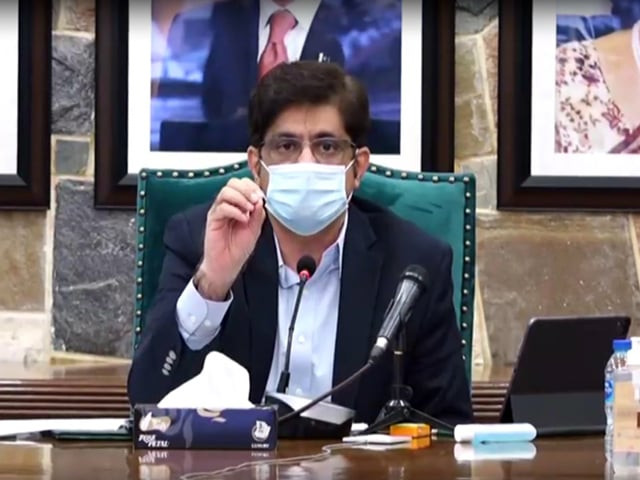Gas crisis may lead to unrest: CM
Murad censures the Centre over its ‘callous’ attitude in a letter to PM Imran

Given the exacerbating gas crisis in the province, Sindh Chief Minister Murad Ali wrote a letter to Prime Minister Imran Khan on Monday voicing fears of an untoward situation developing in the province, especially in Karachi. The CM levelled criticism on the Centre for its failure to ensure sufficient supply of natural gas in Sindh, and pointed out that the crisis that emerged even before the onset of winter this year has further worsened.
In the letter, available with The Express Tribune, the CM held the ‘negligent’ and ‘callous’ attitude of the federal government responsible for the prolonged crisis.
Shah reiterated the Pakistan Peoples Party-led provincial government’s contention in the letter that the domestic consumers of Sindh have the first right over gas produced in the province. But, Shah noted, citizens of the province are now suffering from a shortage of gas as well as routine 12 to 18 hour-long electricity load shedding.
The CM accused the Centre of diverting Sindh’s gas to other provinces and sectors before ensuring that the needs of domestic consumers in the province are met.
“The government of Sindh does not recognise the federal government’s unilateral and arbitrary allocation of gas produced from Sindh to Sui Northern Gas Pipelines Limited (SNGPL) or to power plants and fertilizer plants within the geographical boundaries of Sindh or Punjab,” wrote the CM.
The letter added that despite residing in the province, which produces over 68 per cent of the country’s total natural gas output, the people of Sindh are without sufficient gas supply to cook food in their houses. Besides, the CM added, industries are shutting down given the shortage of gas and low gas pressure. Consequently, daily wage earners are losing their daily income and transport is also coming to a standstill, underscored the CM.
“I fear an untoward situation [emerging] in the province, especially in the city of Karachi,” said the CM.
Highlighting these concerns, the CM cited Article 158 of the Constitution of Pakistan, which reads, “The province in which the well-head of natural gas is situated shall have precedence over other parts of Pakistan in meeting the requirements of natural gas from that well head, subject to the commitments and obligations as on the commencing day”.
Founding his argument on Article 158, the CM further referred to ownership rights of the province after the passage of the 18th Amendment. “Sindh produces about 2,500-2,600 MMCFD gas. The people of Sindh have a first right to this gas,” he said. “It is an irony that SSGC [Sui Southern Gas Company] has reserved a quota of only 900-1000 MMCFD for people of Sindh whereas the constrained
demand is over 1,500-1,600 MMCFD,” Shah lamented.
The CM dubbed this act of allocating natural gas to other sectors, when domestic and indigenous industry needs are not being met, ‘illegal’.
“I request you to please direct the Ministry of Energy (Petroleum Division) to
immediately revise the gas allocation formula and allocate at least 1,500-1,600 MMCFD system gas to consumers in Sindh with first priority to domestic consumers and then to industrial, commercial, power plants distributing electricity locally and other province based sectors, “ urged the CM in his letter to the Centre.
Shah warned that if the current volatile situation is not handled with care then he fears there may be unrest and an even worse crisis in the future.
Worsening crisis
On Friday last, the SSGC took multiple measures to cut back on gas consumption in Karachi. In a bid to deal with the crisis in the megalopolis, the SSGC advised Karachi’s trade and industries associations to notify all industries catering to the domestic market to stop gas consumption for their captive power plants, which are electricity generating facilities. If not, their gas connections will be cut off, the SSGC had warned. The SSGC, however, stated that export units could consume gas for electricity production.
The SSGC also reduced gas supply to fuel stations to three to four days a week.
Published in The Express Tribune, December 29th, 2020.



















COMMENTS
Comments are moderated and generally will be posted if they are on-topic and not abusive.
For more information, please see our Comments FAQ